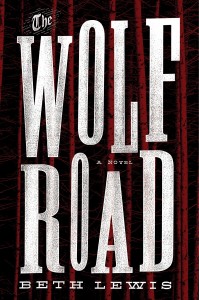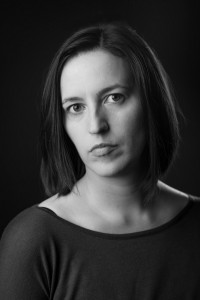Beth Lewis has travelled extensively and while pursuing her many interests has had close encounters with black bears, killer whal es, and great white sharks. She works as a managing editor at a leading London publisher.
es, and great white sharks. She works as a managing editor at a leading London publisher.
The Wolf Road, her debut novel, introduces the reader to Elka, a 17-year-old girl who ten years earlier, was found wandering, lost and hungry by a solitary hunter who took her in. Over the intervening decade, he taught her how to survive in a desolate post-apocalyptic land. Now, Elka is on a quest to locate her parents, but the man she thought she knew has been harboring a secret: he’s a killer and is tracking her. And she may be his next victim.
Elka is a fascinating character. How did you conceive of her?
I came up with the idea for the book from a television show, Hannibal. There was a particular scene where a girl is with her father who is a hunter. It turns out, not all is quite as it seems. There’s a question of whether or not she’s complicit in his crime or if she’s a victim. I thought that scene was very powerful, and felt it was an interesting kind of psychology to explore. Elka derived from that show fully formed, including her voice.
Speaking of voice, Elka’s narrative voice is authentic and unique. I was impressed by the fact that someone from the UK captured a  Southern/wilderness speech pattern. Tell us a bit about that.
Southern/wilderness speech pattern. Tell us a bit about that.
I’ve always loved the Southern storytelling tradition. I also watched so many television shows about Alaska, Canada, and the Yukon. That Southern rhythm and twang coupled with the wilderness inflections melded together into the voice of Elka. I suppose her voice is not truly authentic to any of those places, but it works quite well in a post-apocalyptic tale.
The Wolf Road is filled with beautiful details of a vast and unforgiving wilderness. How do you know so much about the wild?
I travelled through Canada when I was twenty years old and spent a good amount of time in British Colombia and on Vancouver Island. I also watched a great deal of television about those areas as well as nature shows and documentaries. I’ve read many books—especially Jack London’s novels. It’s an area of the world I absolutely love. I wish I lived there, so in a way, the novel is sort of a wish-fulfillment fantasy.
The Wolf Road deals with many things, among them is Elka’s struggle to distinguish between fact and fiction in her own recollections of her past. Will you talk about that?
I wanted to write a book about a character who had done awful things, but by the end of the novel, the reader would still want Elka to win out. Maybe there’s a sense of discomfort in the reader, but I wanted very much for the reader to remain sympathetic to her. I think Elka coming to the realization of her own past at the same time the reader does, helps maintain sympathy for her. In a sense, almost anyone is capable of forgetting the evil he or she has done, or at least, blocking it from consciousness. It was great fun revealing the extremes of Elka’s experiences to the reader.
Talk about her relationship to her parents.
All she has from her parents is a letter they wrote saying they left her with her grandmother. Though she can’t read, she memorized the letter from her grandmother having read it to her. All she remembers of her parents is a feeling she was loved. That’s what sustains her. She maintains the naïve belief they left her to find a fortune. When she actually locates them, she receives quite a shock. Realizing one’s parents are not always what they seem is quite an important part of this coming of age story.
Who are your literary influences?
My biggest influence is Emily Bronte’s Wuthering Heights. That novel really cemented for me the importance of setting and emotion, and the raw brutality of the wild. Apart from Bronte, David Mitchell has had the biggest influence on my writing. He kick-started my wanting to become a writer. When I read Cloud Atlas, a light bulb went off in my head.
Tell us about your road to publication as a novelist.
It feels like it all happened very quickly, but it didn’t. I wrote four novels before The Wolf Road, none of which has been published. I wrote the first draft of The Wolf Road in about three months, and got an agent who was successful in finding a publisher. It’s taken two years from when I started the first draft to publication.
What’s coming next from Beth Lewis?
I’m rewriting my next book which is about four friends who discover a body. The live in a small mid-Western town which is filled with secrets, and they begin unearthing certain things with nasty consequences.
Congratulations on penning The Wolf Road, a brutal and poignant literary journey into the truth of a young woman’s origins and her path to redemption.




